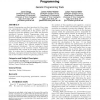844 search results - page 17 / 169 » Generalized crowding for genetic algorithms |
115
click to vote
GECCO
2006
Springer
15 years 5 months ago
2006
Springer
In contrast with the diverse array of genetic algorithms, the Genetic Programming (GP) paradigm is usually applied in a relatively uniform manner. Heuristics have developed over t...
131
click to vote
GECCO
2007
Springer
15 years 5 months ago
2007
Springer
Genetic Programming was first introduced by Koza using tree representation together with a crossover technique in which random sub-branches of the parents' trees are swapped ...
127
click to vote
GECCO
2008
Springer
15 years 2 months ago
2008
Springer
The study of common, complex multifactorial diseases in genetic epidemiology is complicated by nonlinearity in the genotype-to-phenotype mapping relationship that is due, in part,...
121
Voted
GECCO
1999
Springer
15 years 6 months ago
1999
Springer
In this paper, we discuss the adaptability of Coevolutionary Genetic Algorithms on dynamic environments. Our CGA consists of two populations: solution-level one and schema-level o...
103
click to vote
GECCO
2006
Springer
15 years 5 months ago
2006
Springer
An enormous amount of information available via the Internet exists. Much of this data is in the form of text-based documents. These documents cover a variety of topics that are v...



